The silent people in the remote village
(Baonghean) - The rugged terrain, difficult travel, backward life, and limited education level are common characteristics of many highland villages and hamlets that have significantly impacted the implementation of the Population - Family Planning policy. Only with true dedication and enthusiasm can the population officials and collaborators here stay for a long time.
At the end of the year, we had the opportunity to go to Nam Can commune (Ky Son), an area considered the "headland" in the far west of the province, with an international border gate and a border market trading with Laos. Stopping at Truong Son village, we met a woman walking up a steep slope, holding a document in her hand. After asking her, we learned that her name was Ly Y Mo (born in 1989) - a population collaborator of the village.
Taking advantage of the noon time, when the villagers returned from the fields, Y Mo temporarily closed her grocery store to "Go to every alley, knock on every door, and check on each target". She said: "The village has more than 250 Mong ethnic households, located near National Highway 7A but stretching over 3 km, divided into residential clusters with sparse density, so mobilization encountered many difficulties. Not to mention that many people here are illiterate, do not know all of the common language, and are backward in their way of thinking, so the work is even more difficult".
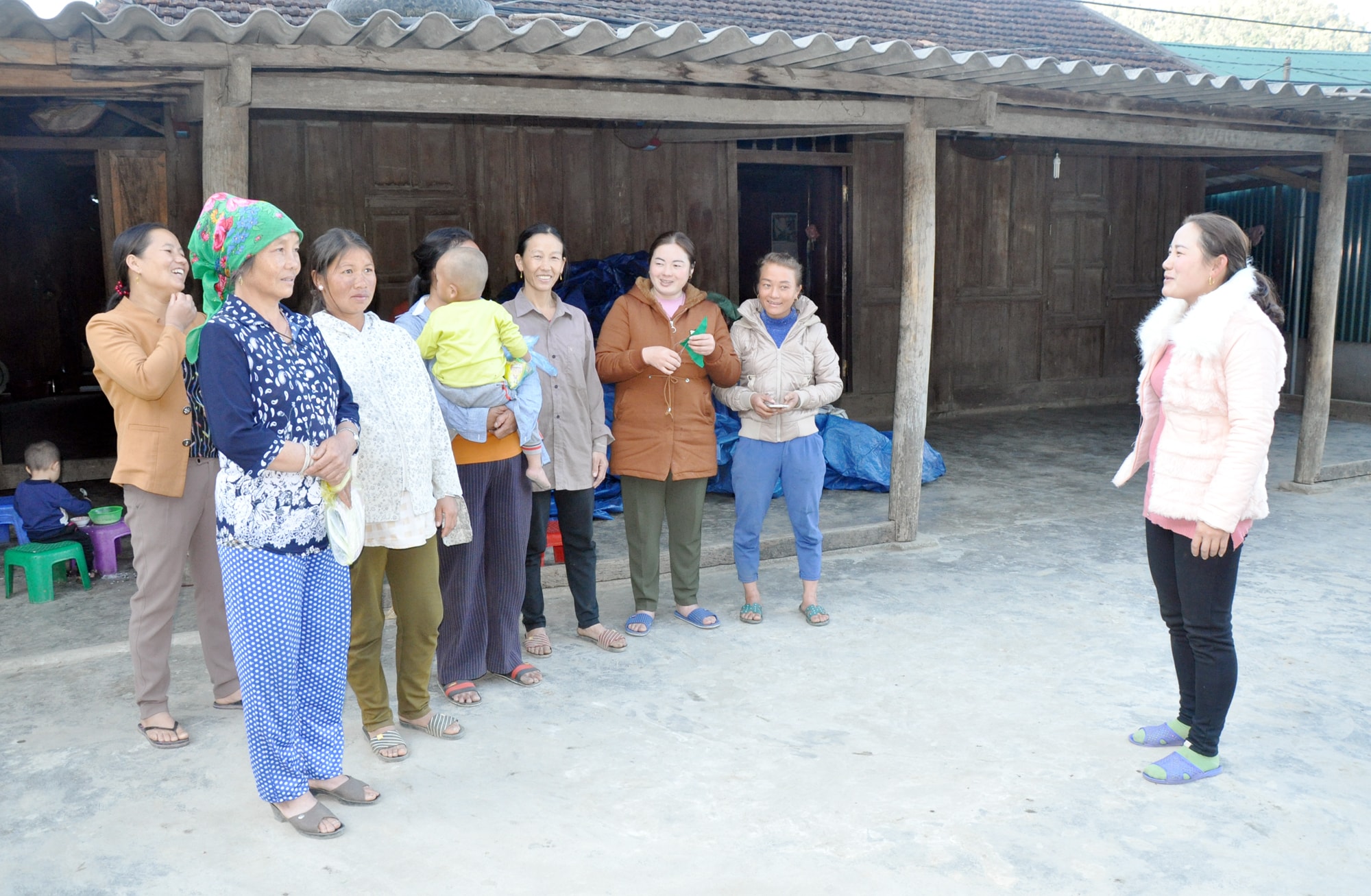 |
| Ms. Ly Y Mo (far right) - population collaborator of Truong Son village, Nam Can commune (Ky Son) practices birth control measures. |
Even Y Mo only finished primary school, then stayed home to work on the farm, got married, and had children. When the Commune Population Committee asked her to become a collaborator, she could not help but hesitate at first because of her limited educational level and not understanding all the common terms. But because of her responsibility to the community and the village, Y Mo boldly accepted, even though she knew she would face many difficulties in terms of knowledge, working skills, and the ability to receive and propagate issues related to population policy.
Up to now, after more than 10 years of working, studying and participating in training courses, her knowledge and skills have been significantly improved. It is worth mentioning that despite the modest allowance, currently 139,000 VND/month, not enough to cover gas costs, Y Mo still works with enthusiasm and responsibility.
In Nam Can, there are also Lau Ba Di, Lau Ba Tua (Huoi Poc village), Lau Y Khu, Va Y Khu (Tien Tieu village), Ngon Thi Huong (Khanh Thanh village)... who are all enthusiastic population collaborators who have been with us for many years. They have in common a limited educational level, with the highest being a junior high school graduate, but they love and are dedicated to their work. No one thinks of doing this for income, but it is entirely from the desire to help the villagers raise their awareness and limit births so that the village life can soon stabilize and develop.
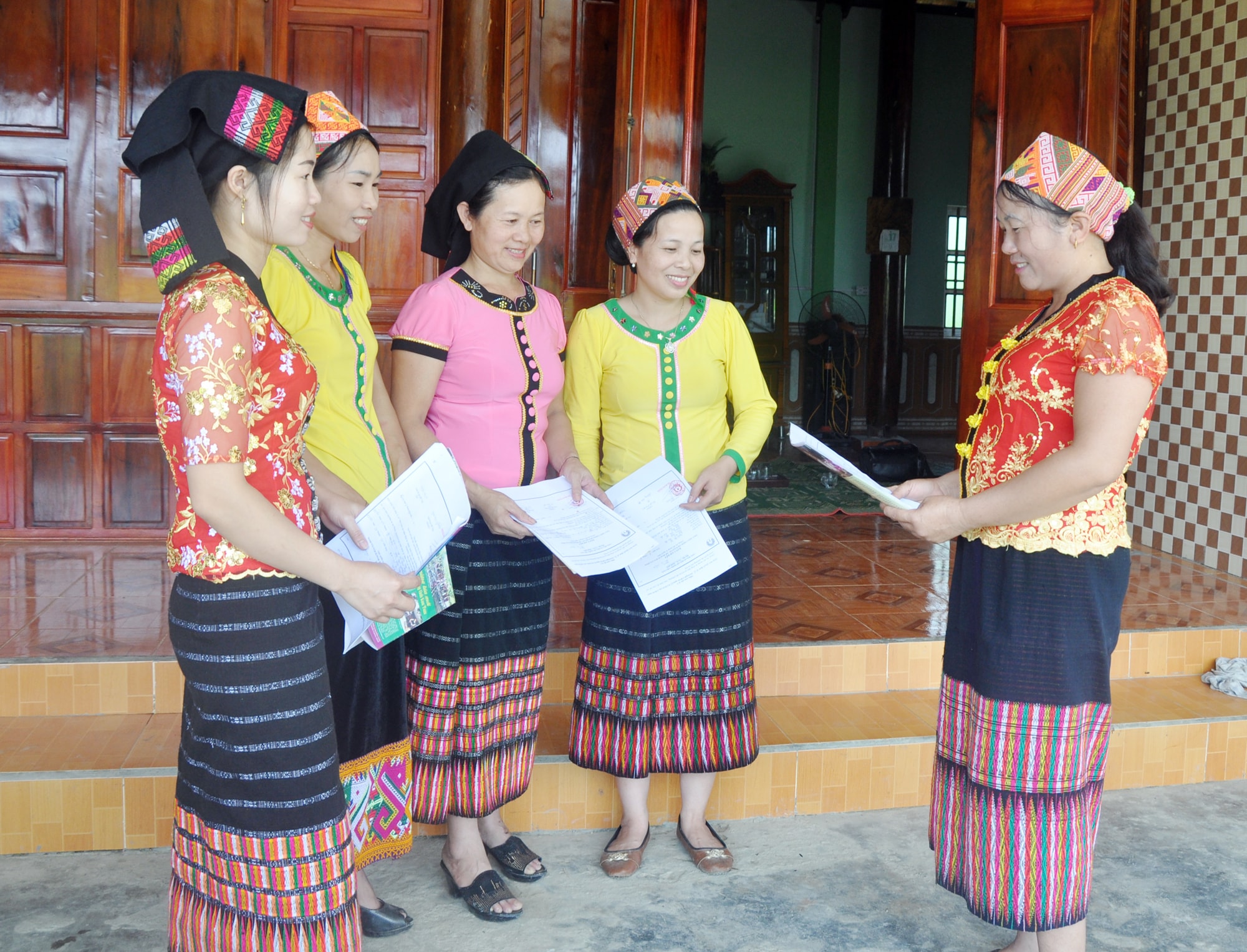 Ms. Vi Thi Nhung (far right) - population collaborator of Met village, Luc Da commune (Con Cuong) mobilized women of childbearing age to sign a commitment not to have a third child. Ms. Vi Thi Nhung (far right) - population collaborator of Met village, Luc Da commune (Con Cuong) mobilized women of childbearing age to sign a commitment not to have a third child. |
As for the commune population officer - Ms. Xong Y Tru (born in 1984), her starting level was only junior high school, the highest level for Mong women in Nam Can. While she was at home farming, the commune leaders came to persuade her to become a population officer, her husband also encouraged and supported her, so she accepted. At that time, she had just started riding a motorbike to serve her work, but she could only travel to villages with convenient roads such as Tien Tieu, Khanh Thanh and Noong De.
As for remote villages like Pa Ca and Huoi Poc, the roads are bumpy and steep, requiring one to walk, and each trip to the base takes at least two days. The most difficult part is still compiling data and making reports. Every month, she has to "struggle" with the numbers to get a report to send to the District Population and Family Planning Center.
The people in the commune are mainly Mong, Kho Mu and Thai ethnic groups, of which Mong people are the majority, most of the women over 40 years old are illiterate, many do not know the common language. Propaganda and mobilization to implement family planning and use contraceptive methods are extremely difficult, because the ability to receive is still very limited, the situation of giving birth to 4-5 children still often occurs.
Ms. Xong Y Tru shared: “I have had a hard time, but the collaborators in the villages, especially the remote villages, have it much harder. Living far from the center, the allowance is not enough to cover travel expenses. Every month, when organizing meetings, I have to cook lunch to invite all the brothers and sisters to both encourage their spirit and help everyone save some of the expenses.”
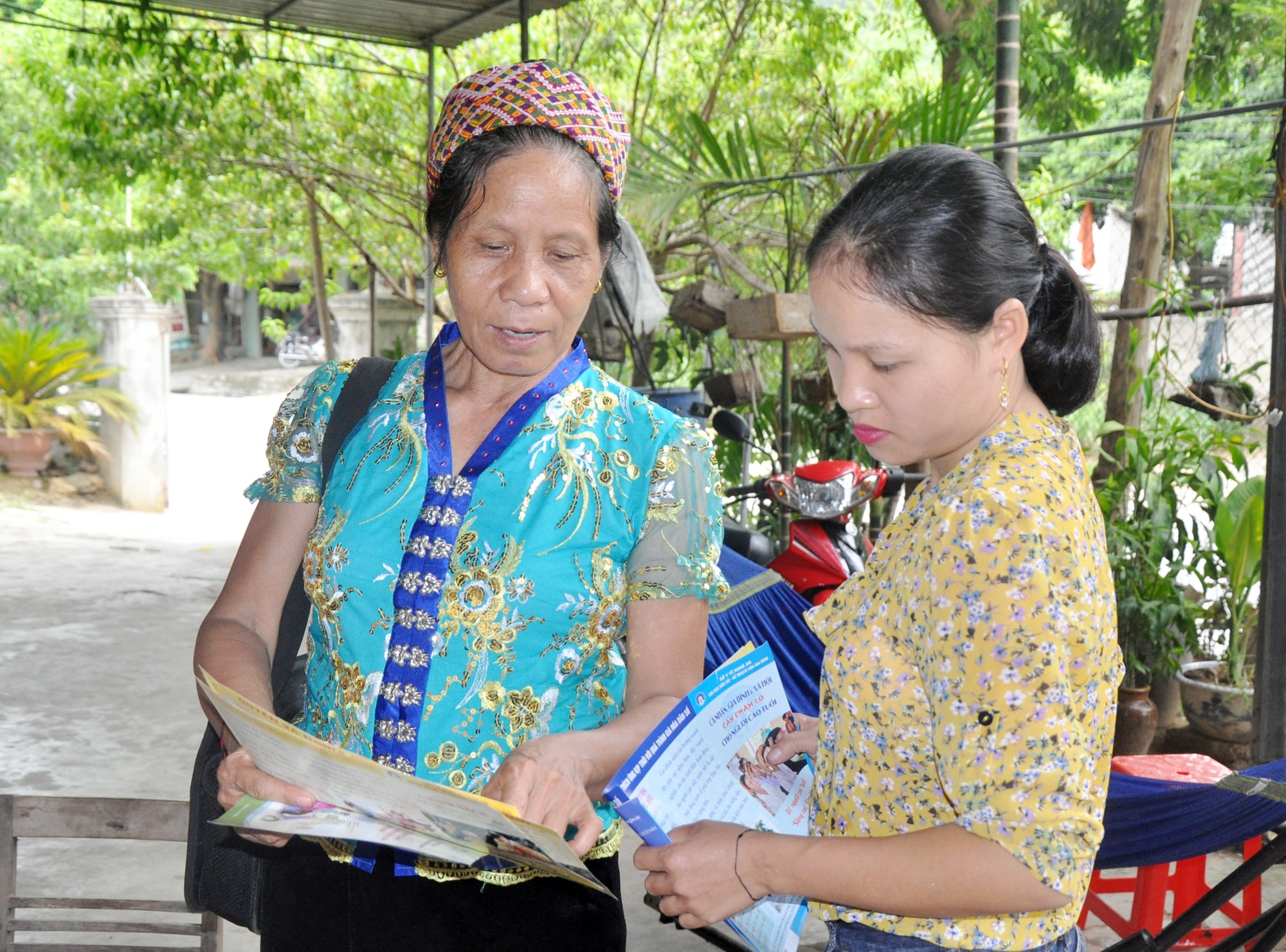 |
| Population officers of Thach Giam commune (Tuong Duong) exchange experiences and promote propaganda. |
According to Mr. Mua Xia Lu - Director of the Center for Population and Family Planning of Ky Son district, these difficulties are not only of Nam Can but also of most communes in the area. Typically, the communes of Keng Du, My Ly, Na Ngoi, Dooc May, Bao Thang, these communes can be said to be facing difficulties on all sides. However, the people working in population work, especially the team of collaborators in the villages are still diligent, sticking to their work, contributing to maintaining the stability of the villages.
And this is also a common situation in mountainous districts such as Tuong Duong, Que Phong and Con Cuong. According to Ms. Vi Thi Hai - a population official of Thach Ngan commune (Con Cuong), in addition to the difficulties in terms of terrain, limited education level, and meager allowances, people working in population work now have additional difficulties when the demographic situation has many fluctuations.
Because in recent years, the number of people working far away from their place of residence has increased, some of whom do not follow the required procedures, affecting statistics, data updates, propaganda and mobilization.
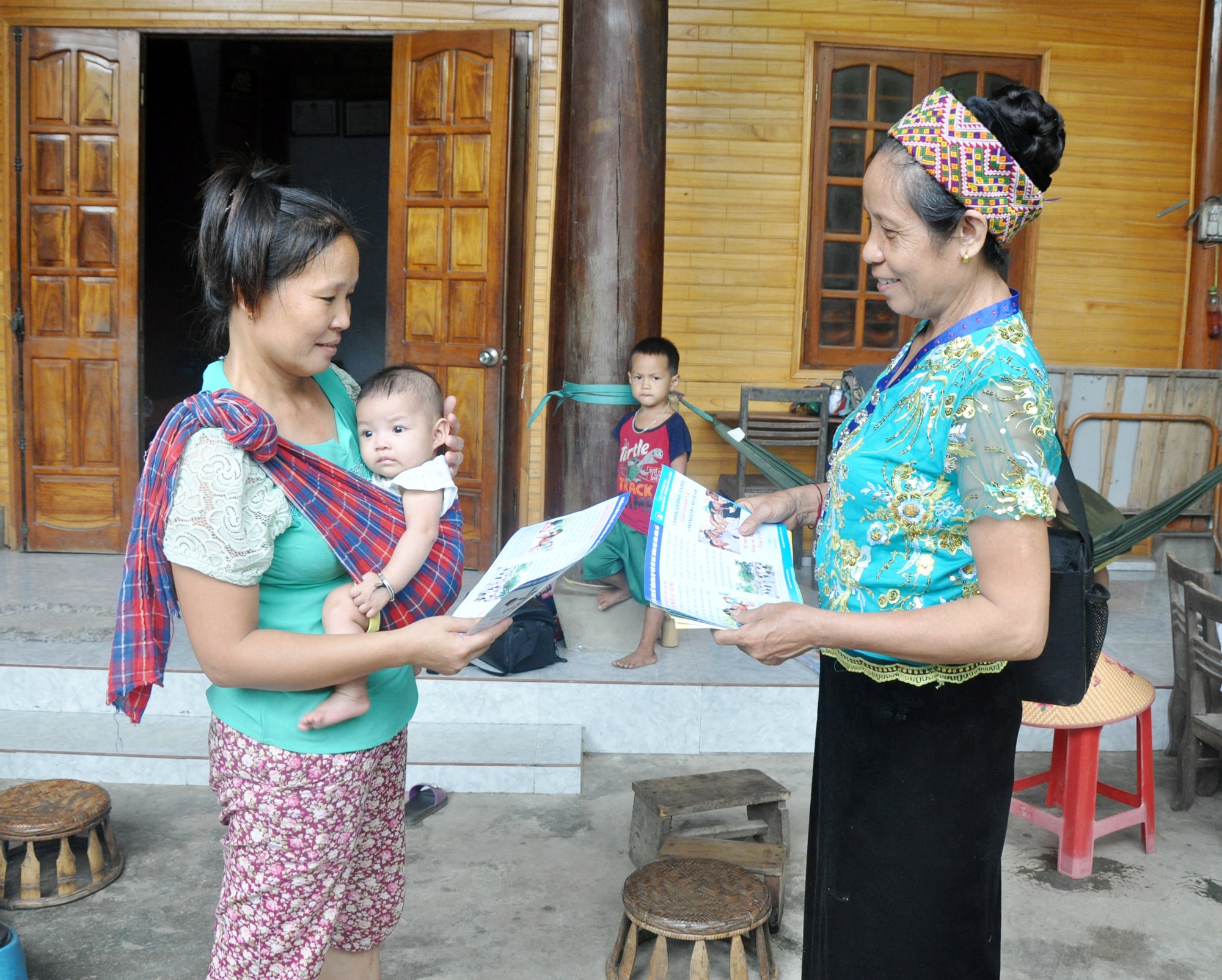 |
| Ms. Luong Thi Lan (right) - population collaborator of Mac village, Thach Giam commune (Tuong Duong) propagates and mobilizes women of childbearing age to apply contraceptive measures. |
Sharing about the difficulties, Ms. Lo Thi Chien - Deputy Director of the Center for Population and Family Planning of Tuong Duong district affirmed that the people doing population work in the area really "eat at home, carry the burden of the whole village".
Especially the team of collaborators in villages and hamlets whose allowances are sometimes not enough for phone bills still work enthusiastically and effectively. This is reflected in the fact that in 2019, up to now, more than 70/154 villages and hamlets have no one giving birth to a third child or more. Particularly in Yen Thang commune, in 2018, all 8/8 villages had no one giving birth to a third child or more; Thach Giam, Tam Dinh and Yen Tinh communes were awarded Certificates of Merit by the Provincial People's Committee for their achievements in implementing the Population - Family Planning work.
It can be said that the people who do population work at the grassroots level are quiet, and those in the highlands have it even more difficult and arduous. That quiet work has made an important contribution to the stability and development of the community and society.

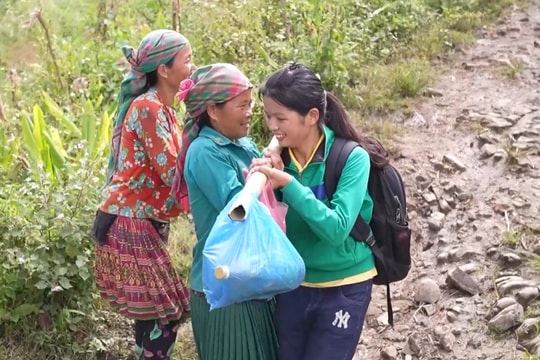



.jpeg)

.jpg)

